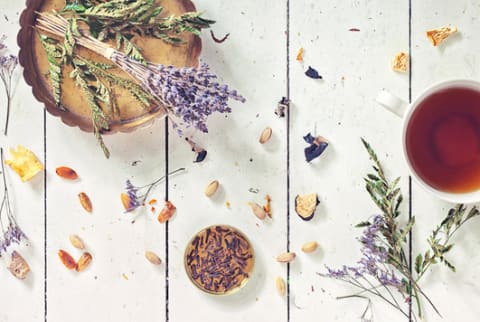Advertisement

Adaptogens have been well-loved for hundreds of years thanks to the way they can support the immune system and physical stamina, but their influence over the mind and mental abilities is just as legendary. As an expert herbalist, they're one of my favorite things to study.
Most adaptogens offer support for the mind, but the kind of support varies from one adaptogen to another. Adaptogens can calm or stimulate the central nervous system or sometimes do both simultaneously, as seems to be the case with schisandra, for example. They can have a positive influence on memory, focus, and learning, or on the amount and quality of mental work we are able to complete.
Although taking too much of certain adaptogens can leave you feeling jittery and out of sorts, the following nine adaptogens are less likely to leave you feeling overstimulated. This makes them good choices if you are already feeling tense from a noisy, distracting environment, coping with stressful events that leave you feeling wired, or struggling with that scattered feeling that can come from overwork.
1. Ashwagandha (Withania somnifera)
This adaptogen has a reputation for being a soothing nervine, and as such it can be well-suited for someone who doesn't want or need a stimulating adaptogen. Nervous system health challenges such as anxiety, fatigue, and insomnia from stress are all good reasons to consider ashwagandha.
2. Dang Shen (Codonopsis pilosula)
In Traditional Chinese Medicine, dang shen is often used as a less expensive, milder alternative to ginseng. Ginseng can be overstimulating for some individuals, so in this case being milder is a good thing! It can be an ideal adaptogen when there is a foggy mental feeling that goes along with being run down and fatigued.
3. Eleuthero (Eleutherococcus senticosus)
Equally suitable for men and women and especially beneficial for the elderly, eleuthero is gentle, supportive, and good for long-term use. Eleuthero offers nervous system and cognitive support for those working extremely stressful jobs or who must work long hours or have erratic schedules.
4. Jiaouglan (Gynostemma pentaphyllum)
Jiaouglan and ginseng share some of the same properties thanks to similarities in chemical makeup, but jiaogulan tends to have a more calming, focusing influence on the nervous system and be less directly stimulating. It can be a nice choice if your difficulty focusing is accompanied by stress-related headaches or anxiety.
5. Rhodiola (Rhodiola rosea)
Rhodiola is part of the official Russian pharmacopoeia as an antidepressant and nerve tonic. Traditionally, this herb was used to increase mental stamina and physical endurance, to boost the immune system during winter, and as a fertility and endocrine tonic for men and women. This herb also appears to increase sleep quality, which can be beneficial for mental focus.
6. Tulsi (Ocimum sanctum)
Tulsi is an Ayurvedic tonic herb that has seen around 3,000 years of traditional use and is considered one of India's most powerful herbs. Modern herbalists employ tulsi for the nervous system where there is mental fog, to support memory, to support recovery from head trauma, and for supporting a positive mood.
7. Schisandra (Schisandra chinensis)
If you hold a dried schisandra berry in your mouth for a few minutes, you will quickly realize that different parts of the fruit have different flavors. The peel is sweet, sour, and a little salty, but when you bite into the seeds you will unleash the bitter and pungent tastes. Although schisandra is generally considered a calming adaptogen, it actually has a double effect on the nervous system. Besides being calming and helping to soothe anxious feelings, it also enhances reflexes and concentration. It's one of my favorite adaptogens for mental focus.
8. Shatavari
This adaptogen and traditional tonic from India has been used for centuries to enhance memory and cognitive function while promoting youthfulness. It also has a reputation as an aphrodisiac for both men and women! It's a useful tonic when there is fatigue and poor appetite.
It's true that adaptogens are great companions for work or study, but remember not to burn the candle at both ends! Support your mind with enough sleep, good food, and even fun and time to relax instead of forcing yourself to run full steam ahead without a break in sight.
May your journey to health and balance be both rewarding and creative!
Lavender and Schisandra Syrup and Soda

With a little seltzer, this easy syrup recipe makes an unusual lemony soda that's great when you are feeling too frazzled to concentrate. Lavender is a calming nervine, and schisandra is also calming to the nervous system. Schisandra supports focus and concentration, though, and with a bit of lemony zip to it, this soda will keep you feeling energized without the crash of regular soda.
I've fondly started calling this one my "study soda," and it's also been a hit when I have friends over and offer them some because I notice that they're feeling a bit stressed. It's refreshing and calming at the same time.
Yields 1½ cups of syrup for 12 to 24 servings (great for a group!)
Ingredients
- 16 ounces water
- 4 tablespoons schisandra berries
- 1 teaspoon lavender buds
- 1 cup sugar
- Juice from 1 medium lemon (2 to 3 tablespoons)
Directions
1. Bring the water to a boil in a medium saucepan.
2. Add the schisandra berries to the boiling water and simmer over low heat for 20 minutes with the lid on. Turn off the heat and let the decoction steep for another 10 minutes.
3. Return the saucepan with the schisandra berries to the stovetop, and bring it to a boil once more. Turn off the heat once more and add the lavender buds. Let the herbs steep for an additional 3 to 5 minutes before straining.
4. Measure the liquid in a heat-safe measuring cup, and add more water if needed to bring it back to 1 cup of liquid.
5. Return the tea to the saucepan and add the sugar. Stir gently over low heat until the sugar has completely dissolved, and add the lemon juice.
6. Allow the syrup to cool and store it in a glass canning jar in the refrigerator. It should be good for several weeks.
7. Stir 1 to 2 tablespoons of the Lavender and Schisandra Syrup into a glass of seltzer to create your schisandra soda.
